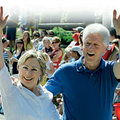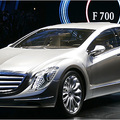
Zach De La Rocha of Rage Against the Machine, the headliner at Rock the Bells on Saturday night, sang and raged against Fox News.

Zack De La Rocha is the lead rapper and agitator and sermonizer of Rage Against the Machine, but on Saturday night at Randalls Island he barely talked between songs. Then, near the end of the set, came the speech everyone was anticipating.
On April 29, during this rap-rock band’s reunion concert at the Coachella festival, Mr. De La Rocha gave a speech accusing the Bush administration of war crimes and said, “They should be hung and tried and shot.” (Hmm. In that order?) A clip found its way to the Fox News program “Hannity & Colmes,” which was not overstocked with Rage Against the Machine fans. The on-screen headline read, “Rock grp ‘Rage Against the Machine’ says Bush admin should be shot.”
Sean Hannity seemed to suggest that the Secret Service should be alerted. Ann Coulter, a guest, got in a good quip (“Has anybody checked in with a Flock of Seagulls to see what their position is on Bush?”), then delivered a final verdict, “They’re losers, their fans are losers, and there’s a lot of violence coming from the left wing.”
On Saturday night Mr. De La Rocha responded. He attacked the “fascist” Fox News pundits for “claiming that we said that the president should be assassinated.” As the crowd shouted its approval, he continued, “No: he should be brought to trial as a war criminal and hung and shot. That’s what we said.” Despite the insistence on due process, this still isn’t a position any mainstream politician would endorse. But that’s precisely the point: At a time when unimpeachable causes and pragmatic endorsements are the norm, it’s nice to be reminded that rock stars can get political without sounding like politicians.
The occasion for this brief oration was a traveling hip-hop festival. Two of them, actually: On Saturday night, the nostalgic hip-hop tour Rock the Bells came to town, with a second stage courtesy of the indie-rap tour Paid Dues. (A second show was scheduled for Sunday night; guerillaunion.com has more tour dates.) The rest of the lineup was strictly hip-hop, though most of the rappers shared the kind of rebellious energy that attracts rock fans. Not coincidentally African-Americans were a tiny minority in the crowd; cargo-shorts wearers most certainly were not.
On a bill with Rage Against the Machine everyone else was an opening act. Not that the other rappers went unappreciated. The second-biggest draw was the Wu-Tang Clan, still mourning the 2004 death of O. D. B., and still unspooling weird rhymes for a crowd that remembered when the Clan was an unlikely commercial juggernaut. The set ended with a complete version of “Triumph,” an unwieldy and mesmerizing single from 1997; there’s no refrain, just nine wordy, erudite verses that seem to go on forever.
Although Chang Weisberg, one of the organizers, has called Rock the Bells “a window into the future” of hip-hop culture, on Saturday it seemed more like a time capsule. The bill included some of the self-consciously bohemian rappers who came of age in the 1990s: Mos Def, Talib Kweli, the Roots and Pharaohe Monch. There was also a genial but rather perfunctory set from the veteran Los Angeles act Cypress Hill, and another from Public Enemy, which endures despite some evident personal friction.
“I was in the middle of something, Chuck,” said Flavor Flav, when Chuck D tried to start a song too soon. Did Chuck D wince in response?
The much smaller Paid Dues stage wasn’t for rookies either; it was for veterans of the indie-rap circuit, most of whom know how to work a crowd, no matter the size. Slug, best known as half of the duo Atmosphere, declaimed his lyrics while grinning and gesticulating; Sage Francis did something similar, only with more politics and less grinning.
Murs, the rapper who organizes Paid Dues, performed with Slug and with his own Living Legends crew. None of this seemed like “the future” of hip-hop, but both stages pointed to a possible future for rock-friendly rappers who have outgrown (or never fit) radio: a summer on the road, entertaining the cargo-shorts crowd. There are worse ways to make a living.
As for Rage Against the Machine, who knows how long this reunion will last; the members haven’t committed to anything beyond a series of live dates. During the hiatus the guitarist Tom Morello, the drummer Brad Wilk and the bassist Tim Commerford played together in Audioslave, but on Saturday night they seemed glad to be playing the old songs again. Maybe the break did everybody good, including those of us who aren’t in the band; no doubt the old favorites wouldn’t have sounded as fresh if these guys had been flogging them nonstop since the 1990s.
The formula is simple and elegant: Mr. Commerford gives these songs all the melody and muscle they need, which leaves Mr. Morello free to do as he pleases. Sometimes he amplifies the bass line by doubling it; sometimes he adds scabrous counterrhythms and countermelodies; sometimes he just makes cool noises. (At one point his pings and squiggles blended pleasantly, if ominously, with the sound of an ambulance floating past on the Triborough Bridge.) Meanwhile Mr. De La Rocha stands and squats and paces, simmering during the quiet parts and boiling over during the loud ones.
Fiery indignation suits Mr. De La Rocha, and it suits this band, which even now embodies the leanness and purposefulness of the righteous guerillas in his lyrics. During “Guerilla Radio,” a fan favorite, the crowd changed along with Mr. De La Rocha: “What better place than here? What better time than now?” Or, in this case, later.





